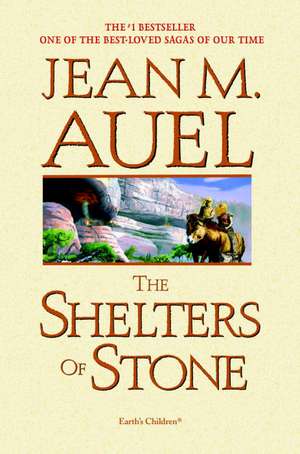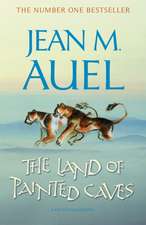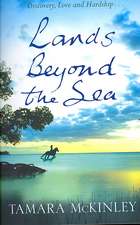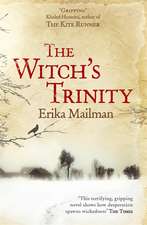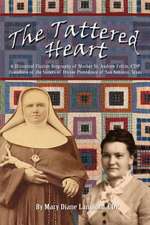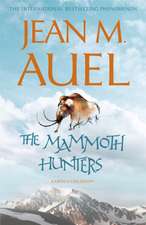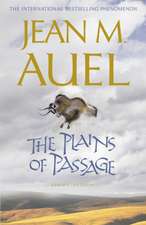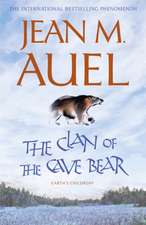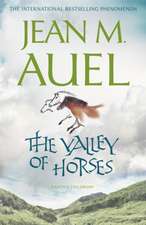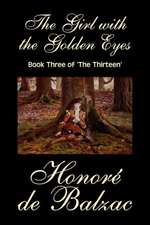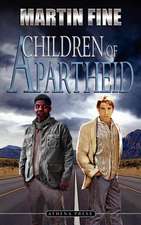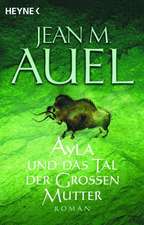The Shelters of Stone: Earth's Children, Book Five: Earth's Children (Paperback)
Autor Jean M. Auelen Limba Engleză Paperback – 31 mar 2004 – vârsta de la 14 până la 18 ani
But as Ayla and Jondalar prepare for the formal mating at the Summer Meeting, there are difficulties. Not all the Zelandonii are welcoming. Some fear Ayla’s unfamiliar ways and abhor her relationship with those they call flatheads and she calls Clan. Some even oppose her mating with Jondalar, and make their displeasure known. Ayla has to call on all her skills, intelligence, knowledge, and instincts to find her way in this complicated society, to prepare for the birth of her child, and to decide whether she will accept new challenges and play a significant role in the destiny of the Zelandonii.
Jean Auel is at her very best in this superbly textured creation of a prehistoric society. The Shelters of Stone is a sweeping story of love and danger, with all the wonderful detail—based on meticulous research— that makes her novels unique. It is a triumphant continuation of the Earth’s Children® saga that began with The Clan of the Cave Bear. And it includes an amazing rhythmic poem that describes the birth of Earth’s Children and plays its own role in the narrative of The Shelters of Stone.
| Toate formatele și edițiile | Preț | Express |
|---|---|---|
| Paperback (3) | 59.00 lei 22-36 zile | +36.30 lei 5-11 zile |
| Hodder & Stoughton – 22 dec 2010 | 59.00 lei 22-36 zile | +36.30 lei 5-11 zile |
| Bantam Books – 30 iun 2003 | 65.12 lei 22-36 zile | +24.28 lei 5-11 zile |
| Bantam – 31 mar 2004 | 125.84 lei 22-36 zile | +64.39 lei 5-11 zile |
Preț: 125.84 lei
Nou
Puncte Express: 189
Preț estimativ în valută:
24.08€ • 25.21$ • 19.92£
24.08€ • 25.21$ • 19.92£
Carte disponibilă
Livrare economică 17-31 martie
Livrare express 28 februarie-06 martie pentru 74.38 lei
Preluare comenzi: 021 569.72.76
Specificații
ISBN-13: 9780553382617
ISBN-10: 0553382616
Pagini: 800
Dimensiuni: 156 x 233 x 34 mm
Greutate: 0.89 kg
Ediția:Bantam Trade Pb.
Editura: Bantam
Seria Earth's Children (Paperback)
ISBN-10: 0553382616
Pagini: 800
Dimensiuni: 156 x 233 x 34 mm
Greutate: 0.89 kg
Ediția:Bantam Trade Pb.
Editura: Bantam
Seria Earth's Children (Paperback)
Notă biografică
Jean M. Auel is an international phenomenon. Her Earth's Children® series has sold more than 45 million copies worldwide and includes The Clan of the Cave Bear, The Valley of Horses, The Mammoth Hunters, The Plains of Passage, The Shelters of Stone, and The Land of Painted Caves. Her extensive research has earned her the respect of archaeologists and anthropologists around the world. She has honorary degrees from four universities and was honored by the French government's Ministry of Culture with the medal of an "Officer in the Order of Arts and Letters". She lives with her husband, Ray, in Oregon.
Extras
People were gathering on the limestone ledge, looking down at them warily. No one made a gesture of welcome, and some held spears in positions of readiness if not actual threat. The young woman could almost feel their edgy fear. She watched from the bottom of the path as more people crowded together on the ledge, staring down, many more than she thought there would be. She had seen that reluctance to greet them from other people they had met on their Journey. It’s not just them, she told herself, it’s always that way in the beginning. But she felt uneasy.
The tall man jumped down from the back of the young stallion. He was neither reluctant nor uneasy, but he hesitated for a moment, holding the stallion’s halter rope. He turned around and noticed that she was hanging back. “Ayla, will you hold Racer’s rope? He seems nervous,” he said, then looked up at the ledge. “I guess they do, too.”
She nodded, lifted her leg over, slid down from the mare’s back, and took the rope. In addition to the tension of seeing strange people, the young brown horse was still agitated around his dam. She was no longer in heat, but residual odors still clung from her encounter with the herd stallion. Ayla held the halter rope of the brown male close, but gave the dun-yellow mare a long lead, and stood between them. She considered giving Whinney her head; her horse was more accustomed to large groups of strangers now, and was not usually high-strung, but she seemed nervous, too. That throng of people would make anyone nervous.
When the wolf appeared, Ayla heard sounds of agitation and alarm from the ledge in front of the cave--if it could be called a cave. She’d never seen one quite like it. Wolf pressed against the side of her leg and moved somewhat in front of her, suspiciously defensive; she could feel the vibration of his barely audible growl. He was much more guarded around strangers now than he had been when they began their long Journey a year before, but he had been little more than a puppy then, and he had become more protective of her after some perilous experiences.
As the man strode up the incline toward the apprehensive people, he showed no fear, but the woman was glad for the opportunity to wait behind and observe them before she had to meet them. She’d been expecting--dreading--this moment for more than a year, and first impressions were important . . . on both sides.
Though others held back, a young woman rushed toward him. Jondalar recognized his younger sister immediately, though the pretty girl had blossomed into a beautiful young woman during the five years of his absence.
“Jondalar! I knew it was you!” she said, flinging herself at him. “You finally came home!”
He gave her a big hug, then picked her up and swung her around in his enthusiasm. “Folara, I am so happy to see you!” He put her down and looked at her at arms’ length. “But you’ve grown. You were just a girl when I left; now you’re a beautiful woman . . . just as I always knew you’d be,” he said, with slightly more than a brotherly glint in his eye.
She smiled at him, looked into his unbelievably vivid blue eyes and was drawn by their magnetism. She felt herself flush, not from his compliment, although that’s what those standing nearby thought, but from the rush of attraction she felt for the man, brother or not, whom she had not seen for many years. She had heard stories of her handsome big brother with the unusual eyes who could charm any woman, but her memory was of a tall adoring playmate who was willing to go along with any game or activity she wanted to play. This was the first time as a young woman that she was exposed to the full effect of his unconscious charisma. Jondalar noticed her reaction and smiled warmly at her sweet confusion.
She glanced away toward the bottom of the path near the small river. “Who is that woman, Jondé?” she asked, “and where did the animals come from? Animals run away from people; why don’t those animals run away from her? Is she a Zelandoni? Has she Called them?” Then she frowned. “Where’s Thonolan?” She took a sharp breath at the look of pain that tightened Jondalar’s brow.
“Thonolan travels the next world now, Folara,” he said, “and I wouldn’t be here if it weren’t for that woman.”
“Oh, Jondé! What happened?”
“It’s a long story, and this is not the time to tell it,” he said, but he had to smile at the name she called him. It was her personal nickname for him. “I haven’t heard that name since I left. Now I know I’m home. How is everyone, Folara? Is Mother all right? And Willamar?”
“They’re both fine. Mother gave us a scare a couple of years ago. But Zelandoni worked her special magic, and she seems fine now. Come and see for yourself,” she said, taking his hand and starting to lead him the rest of the way up the path.
Jondalar turned and waved at Ayla, trying to let her know that he would be back soon. He hated leaving her there alone with the animals, but he needed to see his mother, to see for himself that she was all right. That “scare” bothered him, and he needed to talk to people about the animals. He and Ayla had both come to realize how strange and frightening it was to most people to see animals that did not run away from them.
People knew animals. All the people they had met on their Journey hunted them, and most honored or paid homage to them or their spirits in one way or another. Animals had been observed carefully for as long as anyone could remember. People knew the environments they favored and the foods they liked, their migration patterns and seasonal movements, their birthing periods and rutting schedules. But no one had ever tried to touch a living, breathing animal in a friendly way. No one had ever tried to tie a rope around the head of any animal and lead it around. No one had ever tried to tame an animal, or even imagined that it could be done.
As pleased as these people were to see a kinsman return from a long Journey--especially one that few ever expected to see again--the tame animals were such an unknown phenomenon that their first reaction was fear. It was so strange, so inexplicable, so far beyond their experience or imagination that it could not be natural. It had to be unnatural, supernatural. The only thing that kept many of them from running and hiding, or attempting to kill the fearsome animals, was that Jondalar, whom they knew, had arrived with them, and he was striding up the path from Wood River with his sister, looking perfectly normal under the bright light of the sun.
Folara had shown some courage rushing forward the way she had, but she was young and had the fearlessness of youth. And she was so pleased to see her brother, who had always been a special favorite, that she couldn’t wait. Jondalar would never do anything to harm her and he didn’t fear the animals.
Ayla watched from the foot of the path while people surrounded Jondalar, welcoming him with smiles, hugs, kisses, pats, handshakes using both hands, and many words. She noticed a hugely fat woman, a brown-haired man whom Jondalar hugged, and an older woman whom he greeted warmly and then kept his arm around. Probably his mother, she thought, and wondered what the woman would think of her.
These people were his family, his kin, his friends, people he had grown up with. She was a stranger, a disturbing stranger who brought animals and who knew what other threatening foreign ways and outrageous ideas. Would they accept her? What if they didn’t? She couldn’t go back, her people lived more than a year’s travel to the east. Jondalar had promised that he would leave with her if she wanted--or was forced--to go, but that was before he saw everyone, before he was greeted so warmly. How would he feel now?
She felt a nudge from behind and reached up to stroke Whinney’s sturdy neck, grateful that her friend had reminded her that she was not alone. When she lived in the valley, after she left the Clan, for a long time the horse had been her only companion. She hadn’t noticed the slack in Whinney’s rope as the horse moved closer to her, but she gave Racer a bit more lead. The mare and her offspring usually found friendship and comfort in each other, but when the mare came into season it had disturbed their usual pattern.
More people--how could there be so many?--were looking in her direction, and Jondalar was talking earnestly with the brown-haired man, then waved at her and smiled. When he started back down, he was followed by the young woman, the brown-haired man, and a few others. Ayla took a deep breath and waited.
As they approached, the wolf’s growl became louder. Ayla reached down to hold him close to her. “It’s all right, Wolf,” she said. “It’s just Jondalar’s kin.” Her calming touch was a signal to him to stop growling, not to appear too threatening. The signal had been difficult to teach him, but worth the effort, especially now, she thought. She wished she knew of a touch that would calm her.
The group with Jondalar stopped a short distance away, trying not to show their trepidation or to stare at the animals that openly stared at them and held their place even when strange people approached them. Jondalar stepped into the breach.
“I think we should start with formal introductions, Joharran,” he said, looking at the brown-haired man.
As Ayla dropped both halter ropes in preparation for a formal introduction, which required contact with both hands, the horses stepped back, but the wolf stayed. She noticed the glint of fear in the man’s eye, although she doubted that this man was afraid of much, and glanced at Jondalar, wondering if he had a reason for wanting formal introductions immediately. She looked closely at the unfamiliar man and was suddenly reminded of Brun, the leader of the clan that she grew up with. Powerful, proud, intelligent, competent, there was little he had feared--except the world of the spirits.
“Ayla, this is Joharran, Leader of the Ninth Cave of the Zelandonii, son of Marthona, former Leader of the Ninth Cave, born to the hearth of Joconan, former Leader of the Ninth Cave,” the tall blond man said with seriousness. Then he grinned. “Not to mention brother of Jondalar, Traveler to Distant Lands.”
There were a few quick smiles. His comment relieved the tension somewhat. Strictly, in a formal introduction, a person could give the entire list of their names and ties to validate their status--all their own designations, titles and accomplishments, and all their kin and their relationships, along with their titles and accomplishments--and some did. But as a matter of practice, except in the most ceremonial of circumstances, just the primary ones were mentioned. It was not uncommon, however, for young people, especially brothers, to make jocular additions to the long and sometimes tedious recitation of one’s kinships, and Jondalar was reminding his brother of past years, before he was burdened with the responsibilities of leadership.
“Joharran, this is Ayla of the Mamutoi, Member of the Lion Camp, Daughter of the Mammoth Hearth, Chosen by the Spirit of the Cave Lion, and Protected by the Cave Bear.”
The brown-haired man crossed the distance between himself and the young woman and held out both hands, palms up, in the understood gesture of welcome and openhanded friendship. He did not recognize any of her ties, and he wasn’t entirely sure which were most important.
“In the name of Doni, the Great Earth Mother, I welcome you, Ayla of the Mamutoi, Daughter of the Mammoth Hearth,” he said.
Ayla took both his hands. “In the name of Mut, Great Mother of All, I greet you, Joharran, Leader of the Ninth Cave of the Zelandonii,” she said, then smiled. “And brother of the traveler Jondalar.”
Joharran noticed first that she spoke his language well, but with an unusual accent, and then he became conscious of her strange clothing and her foreign look, but when she smiled, he smiled back. Partly because she had showed her understanding of Jondalar’s remark and let Joharran know that his brother was important to her, but mostly because he could not resist her smile.
Ayla was an attractive woman by anyone’s standards: she was tall, had a firm, well-shaped body, long, dark blond hair that tended to wave, clear blue-gray eyes, and fine features, though of a slightly different character than those of Zelandonii women. But when she smiled, it was as if the sun had cast a special beam on her that lit each feature from within. She seemed to glow with such stunning beauty, Joharran caught his breath. Jondalar had always said her smile was remarkable, and he grinned seeing that his brother was not immune to it.
Then Joharran noticed the stallion prance nervously toward Jondalar, and he eyed the wolf. “Jondalar tells me we need to make some . . . ah . . . accommodation for these animals . . . somewhere nearby, I presume.” Not too near, he thought.
“The horses just need a field with grass, near water, but we need to tell people that they shouldn’t try to get close to them in the beginning unless Jondalar or I am with them. Whinney and Racer are nervous around people until they get used to them,” Ayla said.
“I don’t think that will be a problem,” Joharran said, catching the movement of Whinney’s tail and eyeing her. “They can stay here, if this small valley is appropriate.”
“This will be fine,” Jondalar said. “Though we may move them upstream, out of the way a little.”
“Wolf is accustomed to sleeping near me,” Ayla continued. She noticed Joharran’s frown. “He’s become quite protective and might cause a commotion if he can’t be close by.”
She could see his resemblance to Jondalar particularly in his forehead knotted with worry, and wanted to smile. But Joharran was seriously concerned. This was not a time for smiles, even if his expression gave her a feeling of warm familiarity.
Jondalar, too, had seen his brother’s worried frown. “I think this would be a good time to introduce Joharran to Wolf,” he said.
Joharran’s eyes flew open in near panic, but before he could object, she reached for his hand as she bent down beside the meat eater. She put her arm around the large wolf’s neck to settle an incipient growl--even she could smell the man’s fear, so she was sure Wolf could.
“Let him smell your hand, first,” she said. “That’s Wolf’s formal introduction.” The wolf had learned from previous experience that it was important to Ayla for him to accept within his pack of humans the people she introduced to him in this way. He didn’t like the smell of fear, but sniffed the man to become familiar with him.
“Have you ever really felt the fur of a living wolf, Joharran?” she asked, looking up at him. “If you notice, it’s a little coarse,” she said, leading his hand to feel the animal’s rather shaggy neck fur. “He’s still shedding and itchy, and he loves to be scratched behind the ears,” she continued, showing him how.
Joharran felt the fur, but was more aware of the warmth, and suddenly realized this was a living wolf! And it didn’t seem to mind being touched.
Ayla observed that his hand was not as stiff, and that he actually attempted to rub the place she indicated. “Let him smell your hand again.”
When Joharran brought his hand around toward the wolf’s nose, he widened his eyes again, with surprise. “That wolf licked me!” he said, not sure if it was in preparation for something better--or worse. Then he saw Wolf lick Ayla’s face, and she seemed very pleased about it.
“Yes, you were good, Wolf,” she said, smiling, as she fondled him and roughed up his mane. Then she stood up and patted the front of her shoulders. The wolf jumped up, put his paws on the place she had indicated, and as she exposed her throat, he licked her neck, then took her chin and jaw in his mouth with a rumbling growl, but with great gentleness.
Jondalar noticed the gasps of astonishment from Joharran and the others and realized how frightening the familiar act of wolfish affection must seem to people who didn’t understand. His brother looked at him, his expression both fearful and amazed. “What’s he doing to her?”
“Are you sure that’s all right?” Folara asked at nearly the same time. She could no longer keep still. The other people were making indecisive nervous movements as well.
Jondalar smiled. “Yes, Ayla is fine. He loves her; he would never hurt her. That’s how wolves show affection. It took me a while to get used to it, too, and I’ve known Wolf as long as she has, ever since he was a fuzzy little cub.”
“That’s no cub! That’s a big wolf! That’s the biggest wolf I’ve ever seen!” Joharran said. “He could tear her throat out!”
“Yes. He could tear her throat out. I’ve seen him tear a woman’s throat out . . . a woman who was trying to kill Ayla,” Jondalar said. “Wolf protects her.”
The Zelandonii who were watching breathed a collective sigh of relief when the wolf got down and stood by Ayla’s side again with his mouth open and his tongue hanging out the side, showing his teeth. Wolf had that look that Jondalar thought of as his wolf grin, as though he was pleased with himself.
“Does he do that all the time?” Folara asked. “To . . . anyone?”
“No,” Jondalar said. “Only to Ayla, and sometimes me, if he’s feeling particularly happy, and only if we allow it. He’s well-behaved, he won’t harm anyone . . . unless Ayla is threatened.”
“What about children?” Folara asked. “Wolves often go after the weak and the young.” At the mention of children, looks of concern appeared on the faces of the people standing nearby.
“Wolf loves children,” Ayla quickly explained, “and he is very protective toward them, particularly very young or weak ones. He was raised with the children of the Lion Camp.”
“There was a very weak and sickly boy, who belonged to the Lion Hearth,” Jondalar contributed. “You should have seen them play together. Wolf was always careful around him.”
“That’s a very unusual animal,” another man said. “It’s hard to believe a wolf could behave so . . . unwolflike.”
“You’re right, Solaban,” Jondalar said. “He does behave in ways that seem very unwolflike to people, but if we were wolves we wouldn’t think so. He was raised with people and Ayla says he thinks of people as his pack. He treats people as though they were wolves.”
“Does he hunt?” the man called Solaban wanted to know.
“Yes,” Ayla said. “Sometimes he hunts alone, for himself, and sometimes he helps us hunt.”
“How does he know what he should hunt and what he shouldn’t?” Folara asked. “Like those horses.”
Ayla smiled. “The horses are part of his pack, too. You notice they are not afraid of him. And he never hunts people. Otherwise, he can hunt any animal he wants, unless I tell him not to.”
“And if you say no, he doesn’t?” another man asked.
“That’s right, Rushemar,” Jondalar affirmed.
The man shook his head in wonder. It was hard to believe anyone could have such control over a powerful hunting animal.
“Well, Joharran,” Jondalar said. “Do you think it’s safe enough to bring Ayla and Wolf up?”
The man thought for a moment, then nodded. “However, if there is any trouble . . .”
“There won’t be, Joharran.” Jondalar turned to Ayla. “My mother has invited us to stay with her. Folara still lives with her, but she has her own room, and so do Marthona and Willamar. He’s gone on a trading mission now. She has offered her central living space to us. Of course, we could stay with Zelandoni at the visitors hearth, if you’d rather.”
“I would be pleased to stay with your mother, Jondalar,” Ayla said.
“Good! Mother also suggested that we wait with most formal introductions until we get settled in. It isn’t as though I need to be introduced, and there’s no point in repeating everything to each one when we can do it all at once.”
“We’re already planning a welcoming feast for tonight,” Folara said. “And probably another one later, for all the nearby Caves.”
“I appreciate your mother’s thoughtfulness, Jondalar. It would be easier to meet everyone at once, but you might introduce me to this young woman,” Ayla said.
Folara smiled.
“Of course, I was planning to,” Jondalar said. “Ayla, this is my sister Folara, Blessed of Doni, of the Ninth Cave of the Zelandonii; Daughter of Marthona, former Leader of the Ninth Cave; born to the hearth of Willamar, Traveler and Trade Master; sister of Joharran, Leader of the Ninth Cave; sister of Jondalar . . .”
“She knows about you, Jondalar, and I’ve already heard her names and ties,” Folara said, impatient with the formalities, then held out both hands toward Ayla. “In the name of Doni, the Great Earth Mother, I welcome you, Ayla of the Mamutoi, Friend of Horses and Wolves.”
The crowd of people standing on the sunny stone ledge quickly moved back when they saw the woman and the wolf start up the path along with Jondalar and the small group accompanying them. One or two took a step closer while a few others craned their necks around them. When they reached the stone ledge Ayla got her first view of the living space of the Ninth Cave of the Zelandonii. The sight surprised her.
Though she knew the word “Cave” in the name of Jondalar’s home did not refer to a place, but to the group of people who lived there, and the formation she saw was not a cave, not as she had thought of one. A cave was a dark chamber or series of them within a rock face or cliff, or underground, with an opening to the outside. The living space of these people was the area beneath a huge overhanging shelf jutting out of the limestone cliff, an abri, that provided protection from rain or snow, but was open to daylight.
The high cliffs of the region had once been the floor beneath the surface of an ancient sea. As the calcareous shells of crustaceans that lived in the sea were discarded, they built up on the floor, and eventually became calcium carbonate--limestone. During certain periods of time, for a variety of reasons, some of the deposited shells created thick layers of limestone that were harder than others. When the earth shifted, exposing the sea floor until it eventually became cliffs, the weathering processes of wind and water cut into the relatively softer stone more easily, gouging out deep spaces and leaving ledges of the harder stone between.
Although the cliffs were also riddled with caves, which were common in limestone, these unusual shelflike formations created shelters of stone that made exceptionally good living sites and had been used as such for a great many thousands of years.
Jondalar led Ayla toward the older woman she had seen from the foot of the path. The woman was tall and dignified in her bearing as she waited patiently for them. Her hair, more gray than light brown, was pulled back from her face into one long braid, which was coiled at the back of her head. Her clear, direct, appraising eyes were also gray.
When they reached her, Jondalar began the formal introduction. “Ayla, this is Marthona, former Leader of the Ninth Cave of the Zelandonii; daughter of Jemara; born to the hearth of Rabanar; mated to Willamar, Trade Master of the Ninth Cave; Mother of Joharran, Leader of the Ninth Cave; Mother of Folara, Blessed of Doni; Mother of . . .” He started to say Thonolan, hesitated, then quickly filled in, “Jondalar, Returned Traveler.” Then he turned to his mother.
“Marthona, this is Ayla of the Lion Camp of the Mamutoi, Daughter of the Mammoth Hearth, Chosen by the Spirit of the Cave Lion, Protected by the Spirit of the Cave Bear.”
Marthona held out her two hands. “In the name of Doni, the Great Earth Mother, I welcome you, Ayla of the Mamutoi.”
“In the name of Mut, Great Mother of All, I greet you, Marthona of the Ninth Cave of the Zelandonii, and mother of Jondalar,” Ayla said as they joined hands.
Marthona heard Ayla’s words, wondered at her strange speech mannerism, noted how well she spoke in spite of it, and thought it was either a minor speech defect or the accent of a completely unfamiliar language from a very distant place. She smiled. “You have come a long way, Ayla, left all you knew and loved behind. If you had not, I don’t think I would have Jondalar back home. I am grateful to you for that. I hope you will soon feel at home here, and I will do all I can to help you.”
Ayla knew Jondalar’s mother was sincere. Her directness and honesty were genuine; she was glad to have her son back. Ayla was relieved and touched by Marthona’s welcome. “I have looked forward to meeting you since Jondalar first spoke of you . . . but I have been a little afraid, too,” she replied with a similar directness and honesty.
“I don’t blame you. I would have found it very difficult in your place. Come, let me show you where you can put your things. You must be tired and would like to rest before the welcoming celebration tonight,” Marthona said, starting to lead them toward the area under the overhang. Suddenly Wolf started whining, yelped a little “puppy bark,” and stretched his front paws out with his back end and tail up in a playful posture.
Jondalar was startled. “What is he doing?”
Ayla looked at Wolf, rather surprised as well. The animal repeated his gestures, and suddenly she smiled. “I think he’s trying to get Marthona’s attention,” Ayla said. “He thinks she didn’t notice him, and I think he wants to be introduced.”
“And I want to meet him, too,” Marthona said.
“You don’t fear him!” Ayla said. “And he knows it!”
“I watched. I didn’t see anything to fear,” she said, extending her hand toward the wolf. He sniffed her hand, licked it, and whined again.
“I think Wolf wants you to touch him; he does love attention from people he likes,” Ayla said.
“You do like that, don’t you?” the older woman said as she stroked him. “Wolf? Is that what you called him?”
“Yes. It’s just the Mamutoi word for ‘wolf.’ It seemed like the right name for him,” Ayla explained.
“But, I’ve never seen him take to anyone so fast,” Jondalar said, looking at his mother with awe.
“Nor have I,” Ayla said, watching Marthona with the wolf. “Maybe he’s just happy to meet someone who’s not afraid of him.”
As they walked into the shade of the overhanging stone, Ayla felt an immediate cooling of temperature. For a heartbeat, she shivered with a chill of fear and glanced up at the huge shelf of stone jutting out of the cliff wall, wondering if it could collapse. But when her eyes grew accustomed to the dimmer light, she was astonished by more than the physical formation of Jondalar’s home. The space under the rock shelter was huge, much larger than she had imagined.
She had seen similar overhangs in the cliffs along this river on their way here, some obviously inhabited, though none seemed quite as sizable as this one. Everyone in the entire region knew of the immense rock shelter and the great number of people it housed. The Ninth Cave was the largest of all the communities that called themselves Zelandonii.
Clustered together at the eastern end of the protected space, along the back wall and freestanding in the middle, were individual structures, many quite large, made partly of stone and partly of wooden frames covered with hides. The hides were decorated with beautifully rendered pictures of animals and various abstract symbols painted in black and many vivid shades of red, yellow, and brown. The structures were arranged in a west-facing curve around an open space near the center of the area covered by the overhanging stone shelf, which was filled with a confusion of objects and people.
As Ayla looked more closely, what at first had struck her as a melange of rich clutter was resolving itself into areas dedicated to different tasks, often near to related tasks. It only seemed confusing initially only because so many activities were going on.
She saw hides being cured in frames, and long shafts of spears, apparently in the process of being straightened, leaning against a crosspiece supported by two posts. Baskets in different stages of completion were stacked in another place, and thongs were drying stretched between pairs of bone posts. Long skeins of cordage hung from pegs pounded into crossbeams above unfinished nets stretched across a frame, and loosely woven netting in bundles on the ground. Skins, some dyed various colors, including many shades of red, were cut into pieces and nearby, partially assembled articles of clothing were hanging.
She recognized most of the crafts, but near the clothing was an activity that was entirely unfamiliar. A frame held many strands of thin cord vertically, with a design partially formed from the material woven horizontally across them. She wanted to go over and look closer, and promised herself she would, later. Pieces of wood, stone, bone, antler, and mammoth ivory were in other places, carved into implements--ladles, spoons, bowls, tongs, weapons--most of them with carved and sometimes painted decorations. There were also small sculptures and carvings that were not utensils or tools. They seemed to be made for themselves or some purpose of which she wasn’t aware.
She saw vegetables and herbs hanging high from large frames with many cross pieces, and lower to the ground, meat drying on racks. Somewhat away from other activities was an area scattered with sharp stone chips; for people like Jondalar, she thought, flintknappers who made tools, knives, and spear points.
And everywhere she looked, she saw people. The community that lived under the spacious rock shelter was of a size to match the space. Ayla had grown up in a clan of less than thirty people; at the Clan Gathering, which occurred once every seven years, two hundred people came together for a short period, a huge assembly to her then. Though the Mamutoi Summer Meeting drew a much greater number, the Ninth Cave of the Zelandonii alone comprised of over two hundred individuals living together at this one place, was larger than the entire Clan Gathering!
Ayla didn’t know how many people were standing around watching them, but she was reminded of the time she had walked with Brun’s clan into that congregation of clans and felt all of them looking at her. They had tried to be unobtrusive, but the people who were staring as Marthona led Jondalar, Ayla, and a wolf to her living place weren’t so polite about it. They didn’t try to look down or glance away. She wondered if she would ever get used to living with so many people close by all the time; she wondered if she wanted to.
From the Hardcover edition.
The tall man jumped down from the back of the young stallion. He was neither reluctant nor uneasy, but he hesitated for a moment, holding the stallion’s halter rope. He turned around and noticed that she was hanging back. “Ayla, will you hold Racer’s rope? He seems nervous,” he said, then looked up at the ledge. “I guess they do, too.”
She nodded, lifted her leg over, slid down from the mare’s back, and took the rope. In addition to the tension of seeing strange people, the young brown horse was still agitated around his dam. She was no longer in heat, but residual odors still clung from her encounter with the herd stallion. Ayla held the halter rope of the brown male close, but gave the dun-yellow mare a long lead, and stood between them. She considered giving Whinney her head; her horse was more accustomed to large groups of strangers now, and was not usually high-strung, but she seemed nervous, too. That throng of people would make anyone nervous.
When the wolf appeared, Ayla heard sounds of agitation and alarm from the ledge in front of the cave--if it could be called a cave. She’d never seen one quite like it. Wolf pressed against the side of her leg and moved somewhat in front of her, suspiciously defensive; she could feel the vibration of his barely audible growl. He was much more guarded around strangers now than he had been when they began their long Journey a year before, but he had been little more than a puppy then, and he had become more protective of her after some perilous experiences.
As the man strode up the incline toward the apprehensive people, he showed no fear, but the woman was glad for the opportunity to wait behind and observe them before she had to meet them. She’d been expecting--dreading--this moment for more than a year, and first impressions were important . . . on both sides.
Though others held back, a young woman rushed toward him. Jondalar recognized his younger sister immediately, though the pretty girl had blossomed into a beautiful young woman during the five years of his absence.
“Jondalar! I knew it was you!” she said, flinging herself at him. “You finally came home!”
He gave her a big hug, then picked her up and swung her around in his enthusiasm. “Folara, I am so happy to see you!” He put her down and looked at her at arms’ length. “But you’ve grown. You were just a girl when I left; now you’re a beautiful woman . . . just as I always knew you’d be,” he said, with slightly more than a brotherly glint in his eye.
She smiled at him, looked into his unbelievably vivid blue eyes and was drawn by their magnetism. She felt herself flush, not from his compliment, although that’s what those standing nearby thought, but from the rush of attraction she felt for the man, brother or not, whom she had not seen for many years. She had heard stories of her handsome big brother with the unusual eyes who could charm any woman, but her memory was of a tall adoring playmate who was willing to go along with any game or activity she wanted to play. This was the first time as a young woman that she was exposed to the full effect of his unconscious charisma. Jondalar noticed her reaction and smiled warmly at her sweet confusion.
She glanced away toward the bottom of the path near the small river. “Who is that woman, Jondé?” she asked, “and where did the animals come from? Animals run away from people; why don’t those animals run away from her? Is she a Zelandoni? Has she Called them?” Then she frowned. “Where’s Thonolan?” She took a sharp breath at the look of pain that tightened Jondalar’s brow.
“Thonolan travels the next world now, Folara,” he said, “and I wouldn’t be here if it weren’t for that woman.”
“Oh, Jondé! What happened?”
“It’s a long story, and this is not the time to tell it,” he said, but he had to smile at the name she called him. It was her personal nickname for him. “I haven’t heard that name since I left. Now I know I’m home. How is everyone, Folara? Is Mother all right? And Willamar?”
“They’re both fine. Mother gave us a scare a couple of years ago. But Zelandoni worked her special magic, and she seems fine now. Come and see for yourself,” she said, taking his hand and starting to lead him the rest of the way up the path.
Jondalar turned and waved at Ayla, trying to let her know that he would be back soon. He hated leaving her there alone with the animals, but he needed to see his mother, to see for himself that she was all right. That “scare” bothered him, and he needed to talk to people about the animals. He and Ayla had both come to realize how strange and frightening it was to most people to see animals that did not run away from them.
People knew animals. All the people they had met on their Journey hunted them, and most honored or paid homage to them or their spirits in one way or another. Animals had been observed carefully for as long as anyone could remember. People knew the environments they favored and the foods they liked, their migration patterns and seasonal movements, their birthing periods and rutting schedules. But no one had ever tried to touch a living, breathing animal in a friendly way. No one had ever tried to tie a rope around the head of any animal and lead it around. No one had ever tried to tame an animal, or even imagined that it could be done.
As pleased as these people were to see a kinsman return from a long Journey--especially one that few ever expected to see again--the tame animals were such an unknown phenomenon that their first reaction was fear. It was so strange, so inexplicable, so far beyond their experience or imagination that it could not be natural. It had to be unnatural, supernatural. The only thing that kept many of them from running and hiding, or attempting to kill the fearsome animals, was that Jondalar, whom they knew, had arrived with them, and he was striding up the path from Wood River with his sister, looking perfectly normal under the bright light of the sun.
Folara had shown some courage rushing forward the way she had, but she was young and had the fearlessness of youth. And she was so pleased to see her brother, who had always been a special favorite, that she couldn’t wait. Jondalar would never do anything to harm her and he didn’t fear the animals.
Ayla watched from the foot of the path while people surrounded Jondalar, welcoming him with smiles, hugs, kisses, pats, handshakes using both hands, and many words. She noticed a hugely fat woman, a brown-haired man whom Jondalar hugged, and an older woman whom he greeted warmly and then kept his arm around. Probably his mother, she thought, and wondered what the woman would think of her.
These people were his family, his kin, his friends, people he had grown up with. She was a stranger, a disturbing stranger who brought animals and who knew what other threatening foreign ways and outrageous ideas. Would they accept her? What if they didn’t? She couldn’t go back, her people lived more than a year’s travel to the east. Jondalar had promised that he would leave with her if she wanted--or was forced--to go, but that was before he saw everyone, before he was greeted so warmly. How would he feel now?
She felt a nudge from behind and reached up to stroke Whinney’s sturdy neck, grateful that her friend had reminded her that she was not alone. When she lived in the valley, after she left the Clan, for a long time the horse had been her only companion. She hadn’t noticed the slack in Whinney’s rope as the horse moved closer to her, but she gave Racer a bit more lead. The mare and her offspring usually found friendship and comfort in each other, but when the mare came into season it had disturbed their usual pattern.
More people--how could there be so many?--were looking in her direction, and Jondalar was talking earnestly with the brown-haired man, then waved at her and smiled. When he started back down, he was followed by the young woman, the brown-haired man, and a few others. Ayla took a deep breath and waited.
As they approached, the wolf’s growl became louder. Ayla reached down to hold him close to her. “It’s all right, Wolf,” she said. “It’s just Jondalar’s kin.” Her calming touch was a signal to him to stop growling, not to appear too threatening. The signal had been difficult to teach him, but worth the effort, especially now, she thought. She wished she knew of a touch that would calm her.
The group with Jondalar stopped a short distance away, trying not to show their trepidation or to stare at the animals that openly stared at them and held their place even when strange people approached them. Jondalar stepped into the breach.
“I think we should start with formal introductions, Joharran,” he said, looking at the brown-haired man.
As Ayla dropped both halter ropes in preparation for a formal introduction, which required contact with both hands, the horses stepped back, but the wolf stayed. She noticed the glint of fear in the man’s eye, although she doubted that this man was afraid of much, and glanced at Jondalar, wondering if he had a reason for wanting formal introductions immediately. She looked closely at the unfamiliar man and was suddenly reminded of Brun, the leader of the clan that she grew up with. Powerful, proud, intelligent, competent, there was little he had feared--except the world of the spirits.
“Ayla, this is Joharran, Leader of the Ninth Cave of the Zelandonii, son of Marthona, former Leader of the Ninth Cave, born to the hearth of Joconan, former Leader of the Ninth Cave,” the tall blond man said with seriousness. Then he grinned. “Not to mention brother of Jondalar, Traveler to Distant Lands.”
There were a few quick smiles. His comment relieved the tension somewhat. Strictly, in a formal introduction, a person could give the entire list of their names and ties to validate their status--all their own designations, titles and accomplishments, and all their kin and their relationships, along with their titles and accomplishments--and some did. But as a matter of practice, except in the most ceremonial of circumstances, just the primary ones were mentioned. It was not uncommon, however, for young people, especially brothers, to make jocular additions to the long and sometimes tedious recitation of one’s kinships, and Jondalar was reminding his brother of past years, before he was burdened with the responsibilities of leadership.
“Joharran, this is Ayla of the Mamutoi, Member of the Lion Camp, Daughter of the Mammoth Hearth, Chosen by the Spirit of the Cave Lion, and Protected by the Cave Bear.”
The brown-haired man crossed the distance between himself and the young woman and held out both hands, palms up, in the understood gesture of welcome and openhanded friendship. He did not recognize any of her ties, and he wasn’t entirely sure which were most important.
“In the name of Doni, the Great Earth Mother, I welcome you, Ayla of the Mamutoi, Daughter of the Mammoth Hearth,” he said.
Ayla took both his hands. “In the name of Mut, Great Mother of All, I greet you, Joharran, Leader of the Ninth Cave of the Zelandonii,” she said, then smiled. “And brother of the traveler Jondalar.”
Joharran noticed first that she spoke his language well, but with an unusual accent, and then he became conscious of her strange clothing and her foreign look, but when she smiled, he smiled back. Partly because she had showed her understanding of Jondalar’s remark and let Joharran know that his brother was important to her, but mostly because he could not resist her smile.
Ayla was an attractive woman by anyone’s standards: she was tall, had a firm, well-shaped body, long, dark blond hair that tended to wave, clear blue-gray eyes, and fine features, though of a slightly different character than those of Zelandonii women. But when she smiled, it was as if the sun had cast a special beam on her that lit each feature from within. She seemed to glow with such stunning beauty, Joharran caught his breath. Jondalar had always said her smile was remarkable, and he grinned seeing that his brother was not immune to it.
Then Joharran noticed the stallion prance nervously toward Jondalar, and he eyed the wolf. “Jondalar tells me we need to make some . . . ah . . . accommodation for these animals . . . somewhere nearby, I presume.” Not too near, he thought.
“The horses just need a field with grass, near water, but we need to tell people that they shouldn’t try to get close to them in the beginning unless Jondalar or I am with them. Whinney and Racer are nervous around people until they get used to them,” Ayla said.
“I don’t think that will be a problem,” Joharran said, catching the movement of Whinney’s tail and eyeing her. “They can stay here, if this small valley is appropriate.”
“This will be fine,” Jondalar said. “Though we may move them upstream, out of the way a little.”
“Wolf is accustomed to sleeping near me,” Ayla continued. She noticed Joharran’s frown. “He’s become quite protective and might cause a commotion if he can’t be close by.”
She could see his resemblance to Jondalar particularly in his forehead knotted with worry, and wanted to smile. But Joharran was seriously concerned. This was not a time for smiles, even if his expression gave her a feeling of warm familiarity.
Jondalar, too, had seen his brother’s worried frown. “I think this would be a good time to introduce Joharran to Wolf,” he said.
Joharran’s eyes flew open in near panic, but before he could object, she reached for his hand as she bent down beside the meat eater. She put her arm around the large wolf’s neck to settle an incipient growl--even she could smell the man’s fear, so she was sure Wolf could.
“Let him smell your hand, first,” she said. “That’s Wolf’s formal introduction.” The wolf had learned from previous experience that it was important to Ayla for him to accept within his pack of humans the people she introduced to him in this way. He didn’t like the smell of fear, but sniffed the man to become familiar with him.
“Have you ever really felt the fur of a living wolf, Joharran?” she asked, looking up at him. “If you notice, it’s a little coarse,” she said, leading his hand to feel the animal’s rather shaggy neck fur. “He’s still shedding and itchy, and he loves to be scratched behind the ears,” she continued, showing him how.
Joharran felt the fur, but was more aware of the warmth, and suddenly realized this was a living wolf! And it didn’t seem to mind being touched.
Ayla observed that his hand was not as stiff, and that he actually attempted to rub the place she indicated. “Let him smell your hand again.”
When Joharran brought his hand around toward the wolf’s nose, he widened his eyes again, with surprise. “That wolf licked me!” he said, not sure if it was in preparation for something better--or worse. Then he saw Wolf lick Ayla’s face, and she seemed very pleased about it.
“Yes, you were good, Wolf,” she said, smiling, as she fondled him and roughed up his mane. Then she stood up and patted the front of her shoulders. The wolf jumped up, put his paws on the place she had indicated, and as she exposed her throat, he licked her neck, then took her chin and jaw in his mouth with a rumbling growl, but with great gentleness.
Jondalar noticed the gasps of astonishment from Joharran and the others and realized how frightening the familiar act of wolfish affection must seem to people who didn’t understand. His brother looked at him, his expression both fearful and amazed. “What’s he doing to her?”
“Are you sure that’s all right?” Folara asked at nearly the same time. She could no longer keep still. The other people were making indecisive nervous movements as well.
Jondalar smiled. “Yes, Ayla is fine. He loves her; he would never hurt her. That’s how wolves show affection. It took me a while to get used to it, too, and I’ve known Wolf as long as she has, ever since he was a fuzzy little cub.”
“That’s no cub! That’s a big wolf! That’s the biggest wolf I’ve ever seen!” Joharran said. “He could tear her throat out!”
“Yes. He could tear her throat out. I’ve seen him tear a woman’s throat out . . . a woman who was trying to kill Ayla,” Jondalar said. “Wolf protects her.”
The Zelandonii who were watching breathed a collective sigh of relief when the wolf got down and stood by Ayla’s side again with his mouth open and his tongue hanging out the side, showing his teeth. Wolf had that look that Jondalar thought of as his wolf grin, as though he was pleased with himself.
“Does he do that all the time?” Folara asked. “To . . . anyone?”
“No,” Jondalar said. “Only to Ayla, and sometimes me, if he’s feeling particularly happy, and only if we allow it. He’s well-behaved, he won’t harm anyone . . . unless Ayla is threatened.”
“What about children?” Folara asked. “Wolves often go after the weak and the young.” At the mention of children, looks of concern appeared on the faces of the people standing nearby.
“Wolf loves children,” Ayla quickly explained, “and he is very protective toward them, particularly very young or weak ones. He was raised with the children of the Lion Camp.”
“There was a very weak and sickly boy, who belonged to the Lion Hearth,” Jondalar contributed. “You should have seen them play together. Wolf was always careful around him.”
“That’s a very unusual animal,” another man said. “It’s hard to believe a wolf could behave so . . . unwolflike.”
“You’re right, Solaban,” Jondalar said. “He does behave in ways that seem very unwolflike to people, but if we were wolves we wouldn’t think so. He was raised with people and Ayla says he thinks of people as his pack. He treats people as though they were wolves.”
“Does he hunt?” the man called Solaban wanted to know.
“Yes,” Ayla said. “Sometimes he hunts alone, for himself, and sometimes he helps us hunt.”
“How does he know what he should hunt and what he shouldn’t?” Folara asked. “Like those horses.”
Ayla smiled. “The horses are part of his pack, too. You notice they are not afraid of him. And he never hunts people. Otherwise, he can hunt any animal he wants, unless I tell him not to.”
“And if you say no, he doesn’t?” another man asked.
“That’s right, Rushemar,” Jondalar affirmed.
The man shook his head in wonder. It was hard to believe anyone could have such control over a powerful hunting animal.
“Well, Joharran,” Jondalar said. “Do you think it’s safe enough to bring Ayla and Wolf up?”
The man thought for a moment, then nodded. “However, if there is any trouble . . .”
“There won’t be, Joharran.” Jondalar turned to Ayla. “My mother has invited us to stay with her. Folara still lives with her, but she has her own room, and so do Marthona and Willamar. He’s gone on a trading mission now. She has offered her central living space to us. Of course, we could stay with Zelandoni at the visitors hearth, if you’d rather.”
“I would be pleased to stay with your mother, Jondalar,” Ayla said.
“Good! Mother also suggested that we wait with most formal introductions until we get settled in. It isn’t as though I need to be introduced, and there’s no point in repeating everything to each one when we can do it all at once.”
“We’re already planning a welcoming feast for tonight,” Folara said. “And probably another one later, for all the nearby Caves.”
“I appreciate your mother’s thoughtfulness, Jondalar. It would be easier to meet everyone at once, but you might introduce me to this young woman,” Ayla said.
Folara smiled.
“Of course, I was planning to,” Jondalar said. “Ayla, this is my sister Folara, Blessed of Doni, of the Ninth Cave of the Zelandonii; Daughter of Marthona, former Leader of the Ninth Cave; born to the hearth of Willamar, Traveler and Trade Master; sister of Joharran, Leader of the Ninth Cave; sister of Jondalar . . .”
“She knows about you, Jondalar, and I’ve already heard her names and ties,” Folara said, impatient with the formalities, then held out both hands toward Ayla. “In the name of Doni, the Great Earth Mother, I welcome you, Ayla of the Mamutoi, Friend of Horses and Wolves.”
The crowd of people standing on the sunny stone ledge quickly moved back when they saw the woman and the wolf start up the path along with Jondalar and the small group accompanying them. One or two took a step closer while a few others craned their necks around them. When they reached the stone ledge Ayla got her first view of the living space of the Ninth Cave of the Zelandonii. The sight surprised her.
Though she knew the word “Cave” in the name of Jondalar’s home did not refer to a place, but to the group of people who lived there, and the formation she saw was not a cave, not as she had thought of one. A cave was a dark chamber or series of them within a rock face or cliff, or underground, with an opening to the outside. The living space of these people was the area beneath a huge overhanging shelf jutting out of the limestone cliff, an abri, that provided protection from rain or snow, but was open to daylight.
The high cliffs of the region had once been the floor beneath the surface of an ancient sea. As the calcareous shells of crustaceans that lived in the sea were discarded, they built up on the floor, and eventually became calcium carbonate--limestone. During certain periods of time, for a variety of reasons, some of the deposited shells created thick layers of limestone that were harder than others. When the earth shifted, exposing the sea floor until it eventually became cliffs, the weathering processes of wind and water cut into the relatively softer stone more easily, gouging out deep spaces and leaving ledges of the harder stone between.
Although the cliffs were also riddled with caves, which were common in limestone, these unusual shelflike formations created shelters of stone that made exceptionally good living sites and had been used as such for a great many thousands of years.
Jondalar led Ayla toward the older woman she had seen from the foot of the path. The woman was tall and dignified in her bearing as she waited patiently for them. Her hair, more gray than light brown, was pulled back from her face into one long braid, which was coiled at the back of her head. Her clear, direct, appraising eyes were also gray.
When they reached her, Jondalar began the formal introduction. “Ayla, this is Marthona, former Leader of the Ninth Cave of the Zelandonii; daughter of Jemara; born to the hearth of Rabanar; mated to Willamar, Trade Master of the Ninth Cave; Mother of Joharran, Leader of the Ninth Cave; Mother of Folara, Blessed of Doni; Mother of . . .” He started to say Thonolan, hesitated, then quickly filled in, “Jondalar, Returned Traveler.” Then he turned to his mother.
“Marthona, this is Ayla of the Lion Camp of the Mamutoi, Daughter of the Mammoth Hearth, Chosen by the Spirit of the Cave Lion, Protected by the Spirit of the Cave Bear.”
Marthona held out her two hands. “In the name of Doni, the Great Earth Mother, I welcome you, Ayla of the Mamutoi.”
“In the name of Mut, Great Mother of All, I greet you, Marthona of the Ninth Cave of the Zelandonii, and mother of Jondalar,” Ayla said as they joined hands.
Marthona heard Ayla’s words, wondered at her strange speech mannerism, noted how well she spoke in spite of it, and thought it was either a minor speech defect or the accent of a completely unfamiliar language from a very distant place. She smiled. “You have come a long way, Ayla, left all you knew and loved behind. If you had not, I don’t think I would have Jondalar back home. I am grateful to you for that. I hope you will soon feel at home here, and I will do all I can to help you.”
Ayla knew Jondalar’s mother was sincere. Her directness and honesty were genuine; she was glad to have her son back. Ayla was relieved and touched by Marthona’s welcome. “I have looked forward to meeting you since Jondalar first spoke of you . . . but I have been a little afraid, too,” she replied with a similar directness and honesty.
“I don’t blame you. I would have found it very difficult in your place. Come, let me show you where you can put your things. You must be tired and would like to rest before the welcoming celebration tonight,” Marthona said, starting to lead them toward the area under the overhang. Suddenly Wolf started whining, yelped a little “puppy bark,” and stretched his front paws out with his back end and tail up in a playful posture.
Jondalar was startled. “What is he doing?”
Ayla looked at Wolf, rather surprised as well. The animal repeated his gestures, and suddenly she smiled. “I think he’s trying to get Marthona’s attention,” Ayla said. “He thinks she didn’t notice him, and I think he wants to be introduced.”
“And I want to meet him, too,” Marthona said.
“You don’t fear him!” Ayla said. “And he knows it!”
“I watched. I didn’t see anything to fear,” she said, extending her hand toward the wolf. He sniffed her hand, licked it, and whined again.
“I think Wolf wants you to touch him; he does love attention from people he likes,” Ayla said.
“You do like that, don’t you?” the older woman said as she stroked him. “Wolf? Is that what you called him?”
“Yes. It’s just the Mamutoi word for ‘wolf.’ It seemed like the right name for him,” Ayla explained.
“But, I’ve never seen him take to anyone so fast,” Jondalar said, looking at his mother with awe.
“Nor have I,” Ayla said, watching Marthona with the wolf. “Maybe he’s just happy to meet someone who’s not afraid of him.”
As they walked into the shade of the overhanging stone, Ayla felt an immediate cooling of temperature. For a heartbeat, she shivered with a chill of fear and glanced up at the huge shelf of stone jutting out of the cliff wall, wondering if it could collapse. But when her eyes grew accustomed to the dimmer light, she was astonished by more than the physical formation of Jondalar’s home. The space under the rock shelter was huge, much larger than she had imagined.
She had seen similar overhangs in the cliffs along this river on their way here, some obviously inhabited, though none seemed quite as sizable as this one. Everyone in the entire region knew of the immense rock shelter and the great number of people it housed. The Ninth Cave was the largest of all the communities that called themselves Zelandonii.
Clustered together at the eastern end of the protected space, along the back wall and freestanding in the middle, were individual structures, many quite large, made partly of stone and partly of wooden frames covered with hides. The hides were decorated with beautifully rendered pictures of animals and various abstract symbols painted in black and many vivid shades of red, yellow, and brown. The structures were arranged in a west-facing curve around an open space near the center of the area covered by the overhanging stone shelf, which was filled with a confusion of objects and people.
As Ayla looked more closely, what at first had struck her as a melange of rich clutter was resolving itself into areas dedicated to different tasks, often near to related tasks. It only seemed confusing initially only because so many activities were going on.
She saw hides being cured in frames, and long shafts of spears, apparently in the process of being straightened, leaning against a crosspiece supported by two posts. Baskets in different stages of completion were stacked in another place, and thongs were drying stretched between pairs of bone posts. Long skeins of cordage hung from pegs pounded into crossbeams above unfinished nets stretched across a frame, and loosely woven netting in bundles on the ground. Skins, some dyed various colors, including many shades of red, were cut into pieces and nearby, partially assembled articles of clothing were hanging.
She recognized most of the crafts, but near the clothing was an activity that was entirely unfamiliar. A frame held many strands of thin cord vertically, with a design partially formed from the material woven horizontally across them. She wanted to go over and look closer, and promised herself she would, later. Pieces of wood, stone, bone, antler, and mammoth ivory were in other places, carved into implements--ladles, spoons, bowls, tongs, weapons--most of them with carved and sometimes painted decorations. There were also small sculptures and carvings that were not utensils or tools. They seemed to be made for themselves or some purpose of which she wasn’t aware.
She saw vegetables and herbs hanging high from large frames with many cross pieces, and lower to the ground, meat drying on racks. Somewhat away from other activities was an area scattered with sharp stone chips; for people like Jondalar, she thought, flintknappers who made tools, knives, and spear points.
And everywhere she looked, she saw people. The community that lived under the spacious rock shelter was of a size to match the space. Ayla had grown up in a clan of less than thirty people; at the Clan Gathering, which occurred once every seven years, two hundred people came together for a short period, a huge assembly to her then. Though the Mamutoi Summer Meeting drew a much greater number, the Ninth Cave of the Zelandonii alone comprised of over two hundred individuals living together at this one place, was larger than the entire Clan Gathering!
Ayla didn’t know how many people were standing around watching them, but she was reminded of the time she had walked with Brun’s clan into that congregation of clans and felt all of them looking at her. They had tried to be unobtrusive, but the people who were staring as Marthona led Jondalar, Ayla, and a wolf to her living place weren’t so polite about it. They didn’t try to look down or glance away. She wondered if she would ever get used to living with so many people close by all the time; she wondered if she wanted to.
From the Hardcover edition.
Recenzii
"A powerful story . . . Auel is a highly imaginative writer." —The New York Times Book Review
"Pure entertainment at its sublime, wholly exhilarating best."—Los Angeles Times
"Auel may be creating one of the most believable characters in English fiction—one to rank with Sherlock Holmes, Scarlett O'Hara and a handful of others." —UPI
"Pure entertainment at its sublime, wholly exhilarating best."—Los Angeles Times
"Auel may be creating one of the most believable characters in English fiction—one to rank with Sherlock Holmes, Scarlett O'Hara and a handful of others." —UPI
Descriere
Descriere de la o altă ediție sau format:
The fifth novel in the Earth's Children series, Jean M. Auel's internationally bestselling reconstruction of pre-historic life, when two kinds of human beings, Neanderthal and Cro-Magnon, shared the earth.
